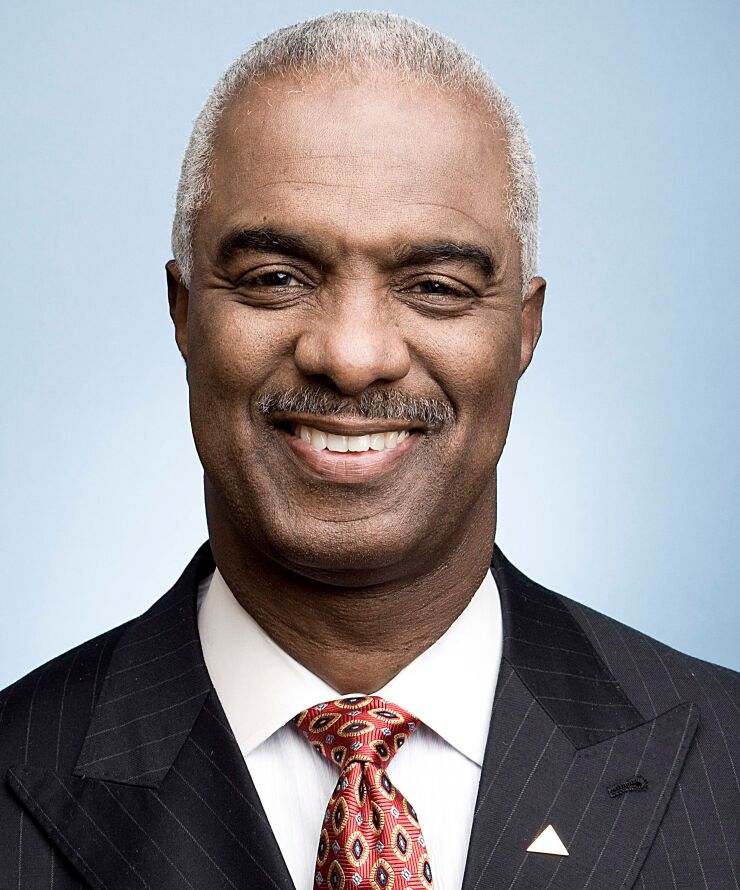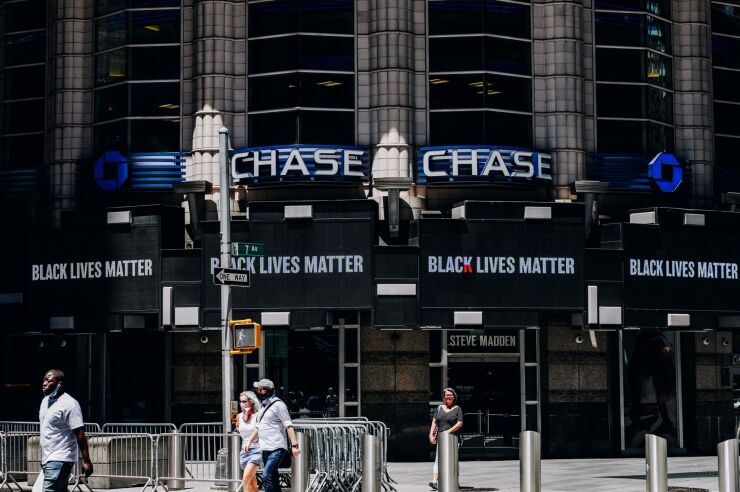Byna Elliott, the head of J.P. Morgan Chase’s Advancing Black Pathways program, had a message for college students that the industry needs them to hear for its own future success.
“This is a great time to pursue a career in financial services and bring your unique talents to corporate America,” Elliott told a group of students in a virtual panel last month held by nonprofit minority internship organization
“Where we started in our careers, a lot of times we were the only ones, and it was much tougher to succeed, but we prevailed,” Elliott said. “Now the environment is so much more conducive and supportive, and we've acknowledged what it takes to create more talent and diverse talent in our firms to be successful.”
In a field in which
Questions loom over it and the many noticeable efforts across the industry to engage historically excluded groups of people

“Corporate America has stepped forward to not just put money behind their commitment to diversity, but employees, activities and meaningful change to avoid systemic racism in corporate America like you've never seen before,” Harper told the students. “I'm convinced that corporate America has taken the role of leadership to make this happen. They're not waiting on government. They're not waiting on anybody to tell them to do it. They're leading it.”
By the numbers
Inroads anticipates it will send out a group of 5,000 interns across all industries this summer, its first coordinating spaces at independent wealth managers through the new FSI program. Over its history, more than 30,000 former Inroads interns have continued into full-time positions, with three-quarters eventually becoming homeowners and 40% amassing between $500,000 and $5 million in wealth,
The organization’s institute, a 10-week training program in financial fields held each spring for college sophomores who identify as Black, has entered its fourth year in partnership with J.P. Morgan, investment bank Houlihan Lokey and Wall Street Bound. In the prior three years, at least 212 students have completed the training, with 75% going on to internships and 89% placed in financial jobs, Inroads figures
The institute “works with students to become the best versions of themselves and has prepared me for the future,” according to a testimonial posted on the site from Georgia State University student Aidya Shorts. “I would recommend this program to all students.”
Elliott, who
“We know that, over the years, there have been times where banks have not been your partner or friend around your development, both from a career perspective, but also around your financial wellness and wealth building,” Elliott said. “The stakeholders — and when I talk about stakeholders, I'm talking about employees, your investors, your community — are asking for a different solution to a problem that we've had in our country for years around systemic racism.”
Wall Street Bound founder Troy Prince launched the nonprofit in 2019 with its first “Introduction to Wall Street” Bootcamp after spending decades in the industry as a trader and angel investor.
“As a young Black person coming from the border of the South Bronx, it became apparent to me that Wall Street either did not have the ability or the intentionality to connect with these communities where we know the young talent lies,” Prince said. “As the leader of an org dedicated to this mission, it's why I wake up every day. It’s my ministry. But also, through my 20-some years on Wall Street in the front office, on trading desks, on the trading floor constantly being the only one, it just never made sense to me. Because, again, we know young people like yourselves out there are ready, are hungry and just need the opportunity.”
New independent internships
The first summer of the Inroads partnership with FSI offers independent brokerages and advisors the opportunity to follow fee-only RIAs participating in
“We began to think about, how do we have corporate America and businesses do better and close the racial wealth gap in America?” Harper said
FSI started a diversity and inclusion task force in September 2020, and the organization’s CEO, Dale Brown, has pledged that
“We worked with our D&I task force last year to try to identify, who are potential partners that can help us leverage the strengths we bring to the table?” Brown said. “We have no interest in reinventing the proverbial wheel. That's not a good use of time, energy, resources. There are organizations out there doing really good work that we can partner with. And we've identified the first one.”
In addition to the new internship program, Brown’s organization released what is likely the first measurement of the demographics among advisors affiliated with independent brokerages. Only 18% are women, 2% are Black, 2% are Latino and 3.5% are Asian American, according to a study of a sample of almost 500 registered representatives by FSI and Broadridge Financial Services in November. FSI plans to continue disclosing the data in the future.

Getting past the barriers
If such figures weren’t enough to give prospective minority advisors pause before trying to enter the industry, some may also be running into mental blocks, Houlihan Loukey co-President David Preiser said at the Inroads panel with Wall Street Bound and J.P. Morgan.
“Our world seems — when you're outside looking up and looking in — it seems really hard to get into,” Preiser told the students. “It seems really daunting that you could ever succeed in the world of finance, but there's absolutely every reason that you can succeed, be successful, have a great career, have a great life. And it's a wonderful pathway because it doesn't require anything except some smarts and some hard work and the willingness to really try hard every day to learn a lot. It's the best business in the world for pulling yourself up and making something out of yourself. I really believe in that, and I want that opportunity to be available to everyone that's willing to work for it.”
Besides the commitment from the participating firms, the industry’s effort to boost the number of advisors who are Black, Latino and other minorities will benefit from the leadership of professionals themselves like Prince who are motivated to create lasting change.
“To be the only is absolutely not acceptable,” he said. “For a person like me that spent my entire career in finance, on Wall Street, for me not to be the one to turn back and bring you young people and bring everyone else with me would be a travesty and waste of that experience. And so Wall Street Bound pretty much was the culmination of my career of just not being satisfied and not being OK with being the only one in the room after so many occasions.”







